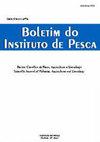饲料中添加金虾粉对太平洋白对虾的免疫力和抗热震性有影响
IF 0.6
4区 农林科学
Q4 FISHERIES
引用次数: 2
摘要
研究了凡纳滨对虾(Litopenaeus vannamei)在饲粮中添加不同的金氧化钇(Aurantiochytrium),对其消化率、免疫参数和低温热休克抗性的影响。0.5;1%和2%)。首先,测定了原料的表观消化率系数。微藻粕对蛋白质的消化率较高(74.90%);脂质约为60%,二十二碳六烯脂肪酸(DHA)为55.61%。随后,在清水系中进行饲料添加剂对虾饲养,每400 L池25只对虾(初始体重:4.89±0.27 g)。每天进食四次。三周后,评估免疫参数并进行热休克。饲喂0.5%和2%的Aurantiochytrium sp.的动物对热休克的存活率较高。免疫分析结果显示,微藻粕添加量为0.5%和2%时血清凝集效价较高(p <0.05),添加量为1%时酚氧化酶活性较高(p <0.05)。综上所述,凡纳滨对虾对黄颡鱼粕中的营养物质有较好的利用,在饲料中添加0.5和1%黄颡鱼粕提高了对虾对热休克的抵抗力。本文章由计算机程序翻译,如有差异,请以英文原文为准。
ADDITION OF Aurantiochytrium sp. MEAL IN THE DIET AFFECTS IMMUNITY AND THERMAL SHOCK RESISTANCE OF THE PACIFIC WHITE SHRIMP
This paper reports the evaluation of digestibility, immunological parameters, and resistance to thermal shock at low temperature in Litopenaeus vannamei fed diets with diferent Aurantiochytrium sp. meal additions (0; 0.5; 1 and 2%). First, the apparent digestibility coefficient of the ingredient was determined. The digestibility of the microalgae meal was high for protein (74.90%); around 60% for lipids, and for docosahexaenoic fatty acid (DHA) it was 55.61%. After, shrimp rearing with the feed additive was carried out in a clear water system, containing 25 shrimp (initial weight: 4.89 ± 0.27 g) per 400 L tank. Feeding occurred four times a day. After a three-week period, immunological parameters were evaluated and thermal shock was performed. Animals fed 0.5% and 2% of the microalgae Aurantiochytrium sp. showed higher survival to thermal shock. In immunological analyses, the serum agglutiniting titer was higher (p <0.05) in the 0.5 and 2% additions of the microalgae meal, and the phenoloxidase activity (PO) was higher in the 1% addition (p <0.05). It is concluded that there is good utilization of the nutrients of Aurantiochytrium sp. meal by L. vannamei and its addition to the diet (0.5 and 1%) increased shrimp resistance to thermal shock.
求助全文
通过发布文献求助,成功后即可免费获取论文全文。
去求助
来源期刊

Boletim do Instituto de Pesca
FISHERIES-ZOOLOGY
CiteScore
0.80
自引率
0.00%
发文量
24
审稿时长
>12 weeks
期刊介绍:
To publish original articles of research and short communications in the following áreas: Fisheries, Aquaculture, Zootechnology, Limnology, Oceanography, Biology and Pathology of aquatic organisms. The publication depends on the approval of the Editorial Board, based on the peer review.
 求助内容:
求助内容: 应助结果提醒方式:
应助结果提醒方式:


